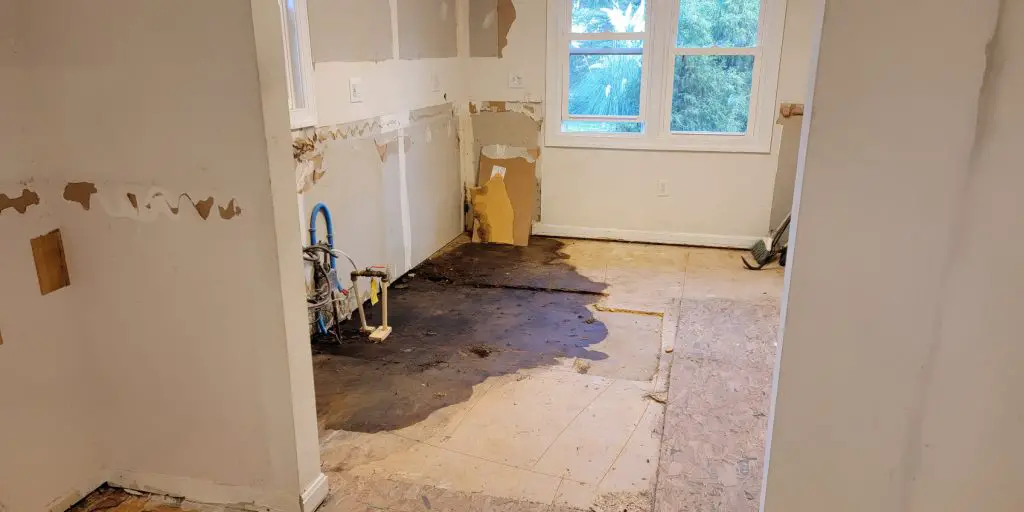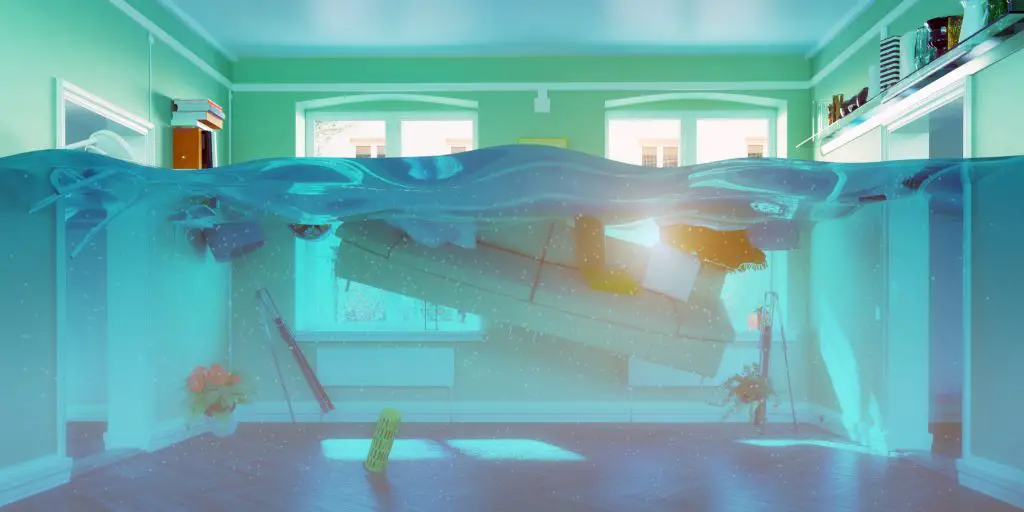It’s the call that we all dread – a tenant telling us there’s a water leak somewhere in the property they rent from you. But who is responsible for water leaks in rented property?
The responsibility for water leaks in rented property depends on the circumstances of the leak. If the leak is due to something outside the tenant’s control, such as a burst pipe or faulty plumbing, the landlord is typically responsible for the cost of repairs. If the leak is due to something the tenant did or did not do, such as not reporting a leak or causing damage to the plumbing, the tenant may be responsible for the cost of repairs.
It is important to review the lease agreement to determine specific responsibilities. Dealing with water leak damage isn’t just costly; it can also be extremely time-consuming and disruptive – both for you and your tenants. As such, having the right insurance in place can save some considerable headaches.
It’s also worth having a plumber check your water and heating systems on a regular basis too. They’ll help you keep ahead of avoidable problems.
As you’ll know if you compared landlord’s insurance before now, not all policies are created equal – so, it’s useful to know some of the terms you’ll find on quotes and policy documents – and look at exactly what kind of cover is provided.
What is a water leak?
A water leak is the uncontrolled flow of water from a source such as a pipe, fixture, or appliance. Water leaks can range from small drips to major flooding and can be caused by a variety of issues including faulty plumbing fixtures, malfunctioning appliances, broken pipes, or simply natural wear and tear over time.
The extent of the damage caused by a water leak depends on the amount of water released, the location of the leak, and how long it goes unnoticed before being fixed.

If left unchecked for an extended period of time, water leaks can cause serious structural damages and costly repairs.
It is important for both tenants and landlords to be aware of potential signs of water leaks in order to address them quickly and mitigate potential losses.
Water leaks can have devastating consequences, so it is important to be aware of the warning signs and address them quickly. But what are some of the potential consequences of water leaks in rental properties? Read on to find out.
Potential consequences of water leaks in rental properties
Water leaks in rental properties can cause a great deal of damage due to the potential cost of repairs and the disruption they may cause to the tenant’s lives.
If a landlord is aware of a water leak, they should act quickly and take steps to rectify it in a reasonable period of time.
If this is not done, it could lead to further damage that could be costly for both parties involved. Potentially, there could be damage to other parts of the property such as furniture or electrical items that are covered by your contents insurance.

Additionally, if the water supply line has been damaged, this could also lead to an increase in service charges and additional costs.
If the tenant discovers a water leak, they should contact their landlord or managing agent immediately with their contact details so that action can be taken swiftly without any further disruption or potential damages occurring.
Citizens Advice provides advice about what actions you can take if you think your landlord is not taking action quickly enough.
How did the damage happen?
Before we dig into policy specifics, it’s important to explore the causes of water damage – and the different attitudes to water leaks that insurances companies can take.
Whether you’re covered by your insurance policy at all often depends on how well maintained your property’s plumbing is.
For instance, if a completely unforeseen pipe failure leads to water damage, there’s no reason to think you won’t be covered. However, if you’ve known about a leaking pipe but you’ve just suggested that tenants ‘keep topping the boiler up’ – then you might find you’re in for a nasty surprise.
Your plumbing tells a story
Although it’s hidden under your floors and behind your walls, an insurance professional can take a look at the system’s condition and make a pretty good assessment if it’s been taken care of well.
It’s not just the condition of the pipework they’re looking at either. They’ll expect to see that measures have been taken to protect the pipework from frost. They will also know if a central heating system has been regularly topped up.
Is your leak covered?
If you can confidently say that your plumbing’s been looked after, or you’ve renewed your plumbing when you’ve refurbished, you probably don’t have anything to worry about if you ever need to make a claim for a leak.
While a gas engineer will make sure your boiler is working as it should each year, you should also have a plumber check your water and heating systems on a regular basis. They’ll help you keep ahead of avoidable problems.
It can be tempting to suggest a quick and easy solution when a tenant picks up the phone and tells you about a puddle of water they’ve found somewhere – but it’s short-sighted; water issues don’t fix themselves – and they only ever get worse.
Is your building covered?
As a minimum, your building will be covered against the damage that comes from a leak.
With recent media focus on flooding in the UK, it’s easy to forget about the chaos that a simple leak can cause – but leak damage and flood damage are usually two distinct elements on a policy.
Generally speaking, water damage resulting from a leak comes from water that originates somewhere inside the property. Flood damage is the opposite – as this is normally caused by external water (from rivers, rain, water mains, etc) entering the property.
Are your contents covered?
When it comes to insurance definitions, you tend to find anything that’s not physically fixed into the property is covered by contents insurance – so whether you’ve provided a handful of white goods, or a house full of furniture, it’s good to know they’re covered if a leak occurs.

Again, not all contents cover follows exactly the same definitions – so talking to your insurer about exactly what you have in the property is a good move before you sign on the dotted line.
It’s worth remembering that tenants’ contents won’t be covered by your policy, so you’ll want to make that clear when any tenancy is signed. Tenants’ contents insurance is usually very affordable, so it’s sound advice encouraging its use when new people move in.
Loss of rent
A good number of landlord’s insurance policies cover loss of rent occurring because of water damage following a water leak – but be careful, as it is sometimes a feature you’ll have to add when you buy your policy.
Whether or not you’re covered for loss of rent will also depend on how the situation unfolds with your tenants. If your loss of rent runs alongside a claim you’re making because of water damage, then you’re likely to be covered – but if tenants are withholding rent because of water damage that you’re not claiming for, that would be something you’d need to explore claiming as part of a tenant default insurance policy.
Frequently Asked Questions
Do landlords have to fix leaky pipes?
Yes, landlords are typically responsible for fixing leaky pipes as it is their duty to maintain the habitability of the rental property. It is important for tenants to report any issues with plumbing to their landlord as soon as possible.
How long can my landlord leave me with a leak?
It depends on the severity of the leak and the laws in your state or country. Generally, landlords are required to address leaks as soon as possible to prevent further damage and potential health hazards. If your landlord is not addressing the issue in a timely manner, you may need to reach out to local housing authorities or seek legal assistance.
Are leaks covered by landlord insurance?
It depends on the type of insurance coverage the landlord has. Generally, standard landlord insurance policies do not cover leaks or water damage caused by natural disasters, but may cover damage caused by burst pipes or other similar incidents. It is important for landlords to carefully review their insurance policies and consider purchasing additional coverage if needed.
Should tenants pay for water leaks?
Tenants should not be responsible for paying for water leaks. Landlords are responsible for maintaining the property and ensuring that it is habitable for their tenants. This includes repairing any water leaks and addressing any other issues that may arise. If a tenant causes the water leak, they may be responsible for fixing the issue, but otherwise, it is the responsibility of the landlord.
Does tenant insurance cover water leakage?
Tenant insurance can cover water leakage if it is included in the policy. However, it is important to check the specific terms and conditions of the policy as coverage can vary. It is also important to report any water leaks to the landlord or property manager as soon as possible to prevent further damage.
How long does a landlord have to fix a leak?
The time frame for a landlord to fix a leak can vary depending on local laws and the severity of the leak. In general, landlords are required to make repairs in a reasonable amount of time, which could range from 24 hours to a few days. It is recommended to notify your landlord promptly and document all communication regarding the repair request.
Final Thoughts
Water leaks can be a major problem for rental property owners and tenants alike. While some water damage is covered by standard landlord insurance policies, it is important for landlords to understand the specific terms of their policy in order to determine what is and isn’t covered.
Additionally, understanding local laws regarding repair requests can help landlords stay on top of repairs and prevent further damage. Ultimately, landlords should make sure to provide their tenants with contact details and respond promptly in the event of any water leak or plumbing issue.
Sources
https://www.adileakdetection.co.uk/
https://www.plumbingforce.co.uk/local/plumber-nottingham/
https://www.bbc.co.uk/news/topics/c26xdmnee19t/floods


